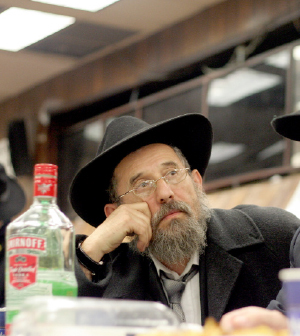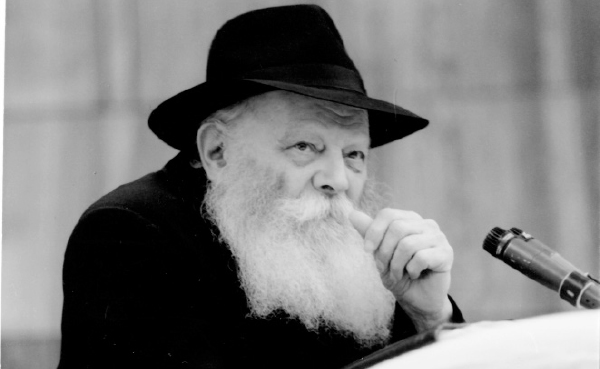The Rebbe’s demand, “do all that you can,” needs to be engraved in our minds and hearts, to remind us and obligate us to do what it takes to bring the Geula.
 In one of his sichos, the Rebbe Rayatz tells of a Chassid of the Rebbe Maharash, by the name of R’ Pesach, a very simple Jew who worked as an agent to distribute merchandise. In Tishrei 5627 R’ Pesach went to the Rebbe Maharash with a group of Chassidim led by R’ Mordechai Yoel of Homil. During his yechidus, the Rebbe said to him: You have the ability to always fulfill “se’u marom eineichem” - lift up your eyes, Shma is Yisroel.
In one of his sichos, the Rebbe Rayatz tells of a Chassid of the Rebbe Maharash, by the name of R’ Pesach, a very simple Jew who worked as an agent to distribute merchandise. In Tishrei 5627 R’ Pesach went to the Rebbe Maharash with a group of Chassidim led by R’ Mordechai Yoel of Homil. During his yechidus, the Rebbe said to him: You have the ability to always fulfill “se’u marom eineichem” - lift up your eyes, Shma is Yisroel.
Upon leaving the yechidus, R’ Pesach asked R’ Mordechai Yoel to explain what the Rebbe meant by this. R’ Mordechai Yoel said that one of the reasons that we make large windows in a shul is to be able to see the sky which is likened to the heavenly throne, and this is a segula for fear of heaven. This is what the Rebbe meant, since you are always traveling on the roads and see the sky, you can fulfill the verse, “lift up your eyes” the first letters of which in Hebrew spell “Shma.” When one has the “Shma” then he is on the level of Yisroel which is higher than “Yaakov.”
The Rebbe Rayatz said, that sixty years later, R’ Pesach told him that since he stopped working as an agent, he always tries to live in a place with large windows. He would sit near the window so he could always fulfill the dictum “lift up your eyes.”
“Over sixty years passed,” said R’ Pesach to the Rebbe Rayatz, “since I heard this from the Rebbe, your grandfather, that Shma is Yisroel. Since then, every time I say “Shma Yisroel” when reciting the Shma, when the Torah is taken out and in Kesser, in the long “V’Hu Rachum,” and on Yom Kippur after N’ila, I remember those words that “Shma is Yisroel.” I ask Hashem that when I say my final Shma, when I need to return my soul, I should have a clear mind so that I can remember what the Rebbe said to me, that Shma is Yisroel.
The Rebbe Rayatz said that he envied the sincerity and hiskashrus of R’ Pesach to a statement of the Rebbe and concluded, “That is the essence of a Chassid, a simple Jew, of my grandfather the Rebbe Maharash.”

REMEMBER AND DO
Once we heard the Rebbe demand “do all that you can to actually bring Moshiach Tzidkeinu,” this call must be constantly echoing in our ears. A genuine Chassid doesn’t wake up once a year when it’s Chaf-Ches Nissan. He lives with what the Rebbe said every minute of the day, seven days a week. These words ought to be engraved in our minds and we need to carry them out with constant renewed energy.
The memory ought to be in a way that arouses the Chassid to take action. In the Laws of Tzitzis in the Rambam it says that the tzitzis remind us of the 613 mitzvos. As the Chinuch puts it, “There is nothing better for memory than someone who bears the stamp of his master fixed upon the clothing with which he is constantly covered and his eyes and heart are upon it all day.”
So too, someone who wears a Moshiach flag lapel pin, for example, needs to know that the purpose of the flag is to remind him (and others) that as long as Moshiach has not come, we cannot rest. We need to take action on all fronts to bring the Geula.
Those who don’t wear a Moshiach pin, should look at his tzitzis or his tallis (when wrapping it one is supposed to think “to draw down His kingdom upon him”), and remember that as long as we are in galus, we cannot perform most of the 613 mitzvos and therefore we must tirelessly work until we have the Geula shleima.
THE “SHMA YISROEL” OF THE 7TH GENERATION
Like R’ Pesach and his “Shma Yisroel,” we too have something to meditate upon in that verse, but the latter part, “Hashem is our G-d, Hashem is one.” Rashi comments, “Hashem who is our G-d now and not the G-d of the nations who worship idols, will in the future be one G-d, as it says in Tz’fania 3:9, ‘For then I will convert the peoples to a pure language that all of them call in the name of Hashem …’ and it says, ‘on that day, Hashem will be one and His name will be one.’”
In seventh generation terminology: We already know that the Rebbe is Moshiach who reveals the kingdom of Hashem in the world, but the entire world does not know this. This is our job - to bring the world to the awareness of the Rebbe’s malchus and to accept his malchus by fulfilling his instructions and learning his teachings.
This job remains in force at all times, as long as we are in galus. As the Alter Rebbe says in Tanya, all the revelations of Yemos HaMoshiach depend on “our actions and work throughout the extended period of exile.” He says “throughout the extended period of exile” and not just “the entire time of exile,” from which we can learn a wondrous allusion.
When you just say “galus,” it refers to the 1947 years of exile, but when you say “throughout the extended period of exile,” it alludes to these final moments that are the “extension” of exile, and it is on our work and deeds at this time, as the exile is ongoing, that all revelations of Yemos HaMoshiach depend.